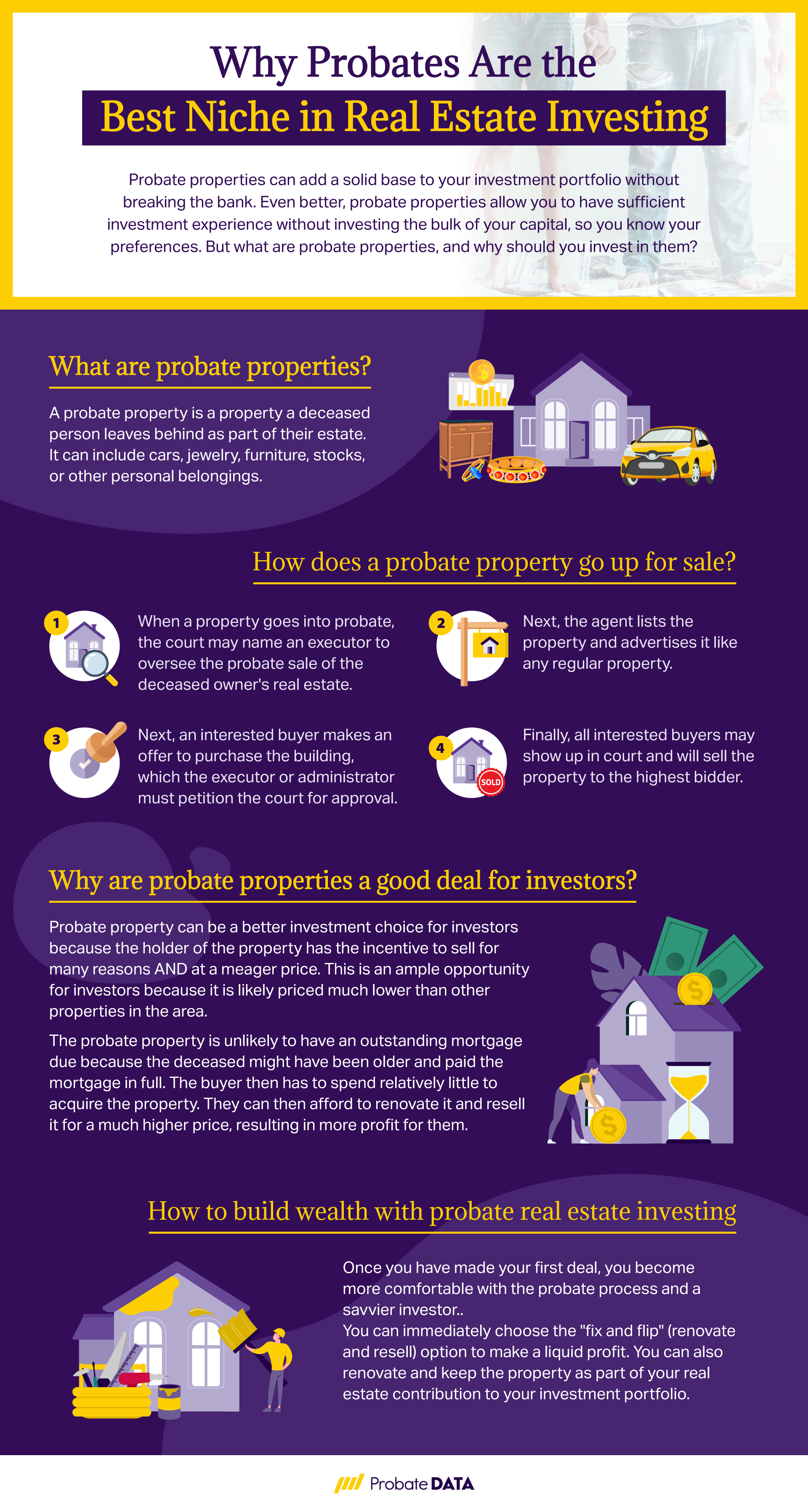Why Probates Are the Best Niche in Real Estate Investing
Jonathan Khorsandi on Dec 21, 2022 posted in Probate Real Estate

Property investment can require substantial money, sometimes large enough to discourage an investor from taking the leap. But probate properties are a cheat code if you are looking to test the waters with a small budget. Probate properties can add a solid base to your investment portfolio without breaking the bank. Even better, probate properties allow you to have sufficient investment experience without investing the bulk of your capital, so you know your preferences. But what are probate properties, and why should you invest in them?
What are probate properties?
A probate property is a property a deceased person leaves behind as part of their estate. It could be cars, jewelry, furniture, stocks, or other personal belongings. However, most professionals use the term "probate property" in reference to probate real estate. Probate real estate is any asset that must sell to pay off a deceased person's debt. "Probate" refers to the court process of distributing the deceased's holdings. So even in the absence of debt, a deceased's real estate goes into probate if they were the sole owner of the property when they died or left no will specifying which property goes to whom.
How does a probate property go up for sale?
When a property goes into probate, the court may name an executor or oversee the probate sale of the deceased owner's real estate. Where the court names an executor or administrator, the person becomes responsible for determining the value of the estate's assets, paying the estate's debts, or selling the estate's personal property. Sometimes, the deceased names an executor who takes up these responsibilities in their will. The executor, in either case, then appoints a real estate agent experienced in probate sales and, with the executor, determines a listing price of all the probate assets. Next, the agent lists the property and advertises it like any regular property. Next, an interested buyer makes an offer to purchase the building, which the executor or administrator must petition the court for approval. The court approval may take up to a month or longer. During this period, the house may remain on the market, and other interested buyers may bid on it. Finally, all interested buyers may show up in court and will sell the property to the highest bidder.
Why are probate properties a good deal for investors?
Probate property can be a better investment choice for investors because often, the holder or executor of the property has the incentive to sell for many reasons. For example, they may decide not to live in or use the property, or they might not want the responsibility of ownership long-term. If any of these is the case, the holder or executor, a friend or family member, may sell the probate property at a meager price. Therefore, a piece of real estate that is – likely in good condition – sold at a meager price is an ample opportunity for investors because it is likely priced much lower than other properties in the area.
Also, the probate property is unlikely to have an outstanding mortgage due because the deceased might have been older and paid the mortgage in full. The buyer then has to spend relatively little to acquire the property. They can then afford to renovate it and resell it for a much higher price, resulting in more profit for them.
The heir or executor of a probate property usually wants to offload the property as soon as possible to avoid paying taxes and fees. They may also want to get the house's full value in order to take care of other expenses. These factors make the probate properties "priced to move." However, it would be best to consider that the holder or executor is usually less emotionally invested in the property, so they are more open to negotiating and selling at a low price.

Pros of investing in probate properties
Unlike other properties, probate properties are an investment gold mine for investors because it is one of the rare occasions where the seller is not particularly interested in making a profit from the sale. A savvy investor sees this as an opportunity to maximize profit by buying at a low price, renovating, and selling for a higher price.
Cons of investing in probate properties
Even in a situation where it seems like selling a probate property is a win-win for everyone, there could be a potential downside for investors. In some cases, years of neglect of the property by the deceased or their family may result in the property being in such a bad condition that it requires excessive improvements to make it resaleable. In such a situation, the investor may spend even more than they would have spent on a regular property on house flipping. They would then have to list it for a higher price than they should have. Sometimes, the resale value may be less than the initial investment.
Another situation is where the probate property's geographical location could be better for potential buyers. When this happens, the investor may get a few offers on the property and then be forced to sell at a lower price.
How to build wealth with probate real estate investing
As an investor, you can offset the cons of probate properties by getting an inspection before investing your money in them. An inspection lets you discover hidden features that could hurt the property's resale value, like a leaky roof and faulty wiring or plumbing. You also get a feel for the general value of the property's location. If the area is declining in value, selling the property at a reasonable profit will be challenging, so you may be wise not to put your money into it.
Once you have made your first deal, you become more comfortable with the probate process and a savvier investor. You can immediately choose the "fix and flip" (renovate and resell) option to make a liquid profit. You can also renovate and keep the property as part of your real estate contribution to your investment portfolio. An investment advisor can give you the best advice on maximizing your probate property investment profit.
Despite the drawbacks of probate properties, it is evident that the pros of investing in probate properties far outweigh the cons. Sign up today and see for yourself.
